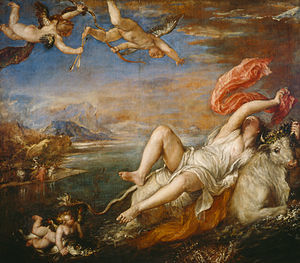
It’s that time of year again. The holy days are upon us. Candles will be lit; hymns will be sung. Many of us will remember the never-married son born to a virgin in Bethlehem, as Christmas began.
And some of us will remember the sexy gods. Once upon a time, Zeus lorded it over Greece. And once upon a time, Jupiter lorded it over Rome. Clouds were gathered and thunderbolts thrown; children all over the world were spawned.
Greek poets like Hesiod—who might have beat Homer in a singing contest—were sure Zeus was a prolific breeder. They made him the father of Athena by Metis; of 3 Hours and 3 Fates and 3 Nymphs by Themis; of Aglaia, Euphrosyne and Thalia by Eurynome; of Persephone by Demeter; of 9 muses by Mnemosyne; of Apollo and Artemis by Leto; of Angelos and Ares and Eileithyia and Enyo and Hebe and Hephaestus by Hera; of Hermes by Maia; of Dionysus by Semele; of Hercules by Alcmene; and so on and so forth.
And Roman poets like Ovid—who got thrown out of Rome for messing around with the first emperor’s daughter—told stories about Jupiter, the Roman Zeus, as a sexual predator. One had him stumble on Io, who was out for a walk by a river; Jupiter halted her flight, and she was molested. But that made his wife Juno jealous, so Io was turned into a heifer. “She made a lovely cow.”
Later on, Jupiter came across Callisto, one of Diana’s hunters; he made himself look like Diana, and raped her. Callisto’s son Arcas was born 9 months later, so Juno hated her; she turned her into a bear, who became Ursa Major. As Ovid remembered, “Jupiter set them in the sky, as neighboring constellations.”
Eventually, Jupiter went after the Phoenician princess Europa; he became a white bull with small horns, and she mounted him of her own accord. “Majesty and love go ill together, nor can they long share one abode,” were Ovid’s words. Europa was carried off to Crete, where she ended up as the mother of King Minos.
And Jupiter seduced Semele, daughter of the king of Thebes. “Many a man has made his way into an honest girl’s bedroom by calling himself a god,” Ovid had Juno say. Semele asked her lover to appear as the god that he was, and he did. That reduced her to ashes; so Bacchus, the son in her womb, was sewn into his father’s thigh.
On earth as it was in myth. The same kinds of things happened in Rome, and in Greece.
There was a consensus that Alexander, the greatest of all Greeks, had descended from Hercules, who like so many other Greeks had descended from Zeus. Alexander’s father, Philip II of Macedon, put Zeus on his coins; and Alexander’s teacher, Aristotle, compared his student to the king of Mt Olympus. “He ought not to be a subject, as if mankind should claim to rule over Zeus,” instead, “all should happily obey such a ruler, according to what seems to be the order of nature.” Legends proliferated. One had Alexander's mother, Olympias, dream about the thunderclap she heard, and the thunderbolt that hit her in the womb, as her son was conceived.
Her son would take after his divine father. After Alexander won a war in Anatolia with Darius III in 333 BC, he put on a Persian scepter and crown, and filled his palace with 365 concubines. “Each night these paraded around the couch of the king so that he might select the one with whom he would lie that night.”
So it would go in Rome. Caligula, who was the third Roman emperor, liked to dress up like Hercules, Castor, Pollux, Bacchus, Mercury, Mars, Apollo and Jupiter: “He made this a pretext for seducing numerous women, even his sisters.” He laid the foundations of a palace on the Capitoline in Rome, so that he and Jupiter could live together in town. And he wanted to be a god abroad. In Jerusalem for instance, he ordered a colossus in the temple with his name written on it, and the title of Zeus.
Caligula was sexy wherever he went. Whenever he asked his senators to dinner, he evaluated their wives as they passed his couch. The ones he liked best would be removed from the room, and their performances reviewed when the emperor escorted them back. Some were borrowed for just a few hours. Seneca told a story about how Valerius Asiaticus overheard the emperor’s assessment of his wife. “Ye gods! What a tale for the ears of a husband! What a fact for an emperor to know!” Others were never returned. Caligula took away Ennia Thrasylla, the wife of his praetorian prefect—swearing to marry her but breaking his promise; he took his own sister away from Cassius Longinus—openly treating her as his lawful consort; he sent for Memmius Regulus’ wife—because somebody had told him her grandmother was pretty; he went to the wedding of Calpurnius Piso, but had the bride (“hands off my wife!”) carried off to his own house. And Caligula’s conquests far extended outside of the city. “Because of his adulteries he was frequently styled imperator as well as Germanicus and Britannicus,” as if he’d subdued the barbarians east and west.
After centuries of celestial sex, celibacy was encouraged on earth. Paul of Tarsus recommended the unmarried to the Corinthian church, and the evangelists Luke and Matthew encouraged abstinence in Rome. From then on there were virgins in heaven, where they played harps.
Roughly half a century after Jesus of Nazareth was born, and around a decade after Caligula was assassinated by his bodyguards on his way to lunch, Paul sent a letter to friends in the city of Corinth.
It was good to be ἄγαμος, or agamos, or unmarried, he wrote. “To the unmarried and the widows I say that it is well for them to remain single as I do” (1 Corinthians 7:8); and “The unmarried man is anxious about the affairs of the Lord, how to please the Lord; but the married man is anxious about worldly affairs, how to please his wife” (1 Corinthians 7:32-33); and “The unmarried woman or virgin is anxious about the affairs of the Lord, how to be holy in body and spirit; but the married woman is anxious about worldly affairs, how to please her husband” (1 Corinthians 7:34).
And it was good to be a παρθένος, or parthenos, or virgin, he said. “Now concerning virgins I have no command of the Lord, but I give my opinion as one who by the Lord’s mercy is trustworthy” (1 Corinthians 7:25); and “If a virgin marries, she has not sinned. Yet those who marry will have worldly troubles, and I would spare you that” (1 Corinthians 7:28); and “He who marries his virgin does well, and he who refrains from marriage will do better.” (1 Corinthians 7:36-38); and “I feel a divine jealousy for you, for I betrothed you to Christ to present you as a pure virgin to her one husband” (2 Corinthians 11:2).
Over the next couple of decades, Paul lost his head in Nero's Rome, and the evangelists elaborated on the importance of abstaining from sex.
To the crowds that followed when he crossed over the Jordan, Matthew's gospel had Jesus say this. “Not all men can receive this precept, but only those to whom it is given. For there are eunuchs who have been so from birth, and there are eunuchs who have been made eunuchs by men, and there are eunuchs who have made themselves eunuchs for the sake of the kingdom of heaven. He who is able to receive this, let him receive it” (Matthew 19:11-12).
And toward the end of his ministry, toward the end of his life, as he was being led away to Golgotha to be hung on a cross, the gospel of Luke put these words in Jesus’ mouth. “Daughters of Jerusalem, do not weep for me, but weep for yourselves and your children. For behold, the days are coming when they will say, ‘Blessed are the barren, and the wombs that never bore, and the breasts that never gave suck!’" (Luke 23:28-29).
Then in the apocalypse of John, who was in exile from Rome, there was a song on Mt Zion, sung by 144,000 virgins. "It is these who have not defiled themselves with women, for they are chaste" (Revelations 14:4).
Those were the beginnings of Christmas. And the beginnings of the end for sexy gods.
References
Betzig, Laura. 2020. Every kingdom divided against itself: The evolution of Christianity. In J. Feierman and L. Oviedo, The Evolution of Religion. London: Routledge, pp. 271-284.
Betzig, Laura. 2005. Politics as sex: The Old Testament case. Evolutionary Psychology 3: 326-346.




